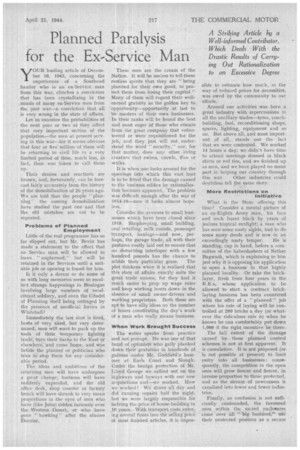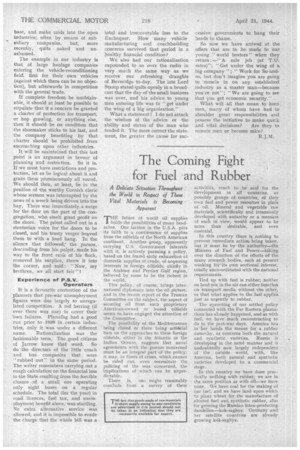Planned Paralysis for the Ex-Service Man
Page 31

Page 32

If you've noticed an error in this article please click here to report it so we can fix it.
yOUR leading article of December 10, 1943, concerning the experiences., of . a Southend haulier who is' an ex-Service man from this war, clinches a conviction . that has been crystallizing in the minds of many ex-Service men from the past war—a conviction that all is vary wrong in the state of affairsl Let us examine the probabilities of the next year or two as they affect that very important section of the population—the men at present serving in this war—for it seems obvious that four or five. millionof them will be returning to civil life in a very limited period of time, much less, in fact, than was taken to call them
• up. .
Their, desires and reactions are known, and, fortunately, can be forecast fairly accurately from the history of the demobilization of 26 years ago. We are told that the people " planning '' the coming demobilization have studied the past one and that the old mistakes are not to be repeated.
Problems of Planned Employment
Little of the real programme has so far slipped out, but Mr. Bevin has made a statement to the effect that no Service man will be allowed to leave " unplanned," but will be retained in the Services until a suitable job or opening is found for him.
Is it only a dream or do some of us with long memories seem to recollect strange happenings in Boulogne involving large numbers of recalcitrant soldiery, and even the Citadel of Planning itself being outraged by. the presence, of unofficial lorries in Whitehall?
Immediately the last shot is fired, hosts of very tired, but very determined, men will want-to pack up the tools of their . -temporary fightirig trade, turn their backs to the East or 'elsewhere', and come. home, and woe betide the planner or politician who tries to stop them for any consider
able period. .
The ideas and ambitions of the returning men will have undergone a great change; horizons will have suddenly expanded, and the old office cleAk, shop counter or factory bench will have shrunk to very mean proportions in the eyes of men who have (like jehu) ridden furiously over the Western Desert,. orwho have gone " hawking" after the elusive Dornier. These men are the cream of .the Nation. It will be useless to tell these restless spirits that they are " being planned for their own good, to protect them from losing their capital." Many of them will regard their wellearned gratuity as the golden key to opportunity—opportunity at last to be masters of their own. businesses.
In their ranks will be found the best and most eager of those who remain from the great company that volunteered or were requisitioned for, the job, and they . just will not . under stand the word "security,'' nor, for that matter, does any other Jiving creature that swims, crawls, flies or walks.
It is when one looks around for the openings into which this vast host is to be fitted that the damage caused to the business edifice by rationalization becomes apparent. The problem
was difficult enough after the War of 19 l4-18-e-now it looks almost hopeless.
Consider the avenues to small businesses which have been closed since 1918. Shopkeeping, small building; coal retailing, milk rounds, passenger transport, haulage—and now, per haps, the garage trade, all with their pastures neatly laid out to ensure that no disturbing interloper with a few , hundred pounds has the chance to nibble their particular grass. The plot thickens when it is realized that this state of affairs exactly suits the great trade Unions, for they find, it' nuich easier to prop up wage rates and keep working hours down in the absence of small owner-drivers and working proprietors. Both these are apt to have silly ideas on the number of hours constituting the day's work of a man who really means business.
When Work Brought Success
The writer speaks from practice and not precept. He was one of"that band of optimists who gaily Planked down their gratuities in hundreds ot guin.eas under -Mr. Goddard's hamMer at Earls Court and Slough. Under the benign protection of Mr. Lloyd George we. sallied out on the highways and byways with our new acquisitions and—we worked. How we worked We' drove all day and did running repairs half the night, but we were largely responsible for halving the price of house-building in .10 years.-.. With transport costs entering several times into the selling Price of most finished articles, it is impos
sible to estimate how much, in the way of reduced prices for necessities, was owed by the community to our efforts.
Around our activities was born a great industry with -repercussions in all the ancillary trades—tyres, coachbuilding, fuel, reconditioning shops, spares, lighting, equipment and so on But above all, and most import-. ant of all, stands out the fact that we were contented. We worked 14 hours a day; we didn't have time to attend -meetings dressed in black shirts or red ties, and we finished up as men, and we have played no mean part in helping our country through
this war. Other industries 'could doubtless tell the same story, , .
More Restrictions on . Initiative
What is the State offering this time? Consider a mental picture of an ex-Eighth Army roan, his face and neck burnt black by years of jealous tropical sunlig,ht; a man who has seen some nasty sights, had to do some nasty deeds and is now in an exceedingly nasty temper. He is standing, cap in hand, before a committee of the haberdashers of Nether Bagwash, which is explainin.g.to him just why it is opposing his application to open a business in that highly planned locality. Or take the bricklayer, fresh from four years in the R.E.s, whose application. to be allowed to start a contract bricklaying business has been countered with the offer of a " planned ". job where his rate of laying will be controlled at 280 bricks a. day (or whatever the ridiculous rate is) when -he. knows he can comfortably put.down 1,000 if the right incentive be there.
The full -etent of the damage caused by. these planned control schemes is not at first apparent: It is cumulative. It is not proposed (or is not possible at present) to limit entry into all businesses ; consequently, the competition in the open ones will grow fiercer and fiercer, in inverse proportion to those protected, and as the stream of newcomers is canalized into fewer and fewer industries.
Finally, as confusion is not sufficiently confounded, the favoured ones within the, sacred...enelosures Come 'over-all big hnSirresa," use:' their protected position as a secure
base, and make raids into the open total and irrecoverable loss to the industries; often by means of sub
sidiary, companies, but; more
recently, quite naked and un ashamed.
The example in our industry is that of large haulage companies entering the vehicle-reconditioning field, first for their own vehicles (against which there can be no objection), but afterwards in competition with the general trade.
If complete. freedom be unobtainable, it should at least be possible to stipulate that if a concern be granted a charter of protection for transport, or hop growing, or anything else, then it should be on condition that the shoemaker sticks to his last, and the company benefiting by that charter should be prohibited from encroaching upon other industries.
It will be maintained that this last pOint is an argument in favour of planning and restriction. So it is. If we must have restrictions and protection, let us be logical about it and grant them promiscuously all round. We should then, at least, be in the position of the worthy Cornish cleric whose sermon was interrupted by the news of a wreck being driven into the bay. There was immediately a surge for the door on the part of the congregation, who smelt great profit on. the shore. The priest called out in a stentorian voice for the doors to be closed, and his trusty verger he4ved them to with a load bang. In the silence that followed; the parson, descending from his pulpit, made his way to the front rank of his flock, removed his surplice, threw it into the corner, and said : "Now, my brethren, we all start fair" I
Experience of P.S.V.
Operators
It is a favourite contention of the planners that pre-war unemployment figures were due largely to unregulated competition. A red herring (if ever there was one) to cover their -own failures. Planning had a good run prior to 1939 in certain industries, only it was under a different name. Rationalization was the fashionable term. The good citizens of Jarrow know that word. So • do the directors of the little coach and bus companies that were " rubbed out" in the same period. The writer remembers carrying out a rough calculation on the financial loss to the State resulting from the forcible closure of a small one operating only eight buses on a regular schedule. The total (for the year) in road licences, fuel tax, and unemployment benefit alone, was startling. No extra alternative service was allowed, and it is impossible to evade the charge that the whole bill was a
Exchequer. How many vehicle manufacturing and coachbuilding concerns survived that period in a healthy financial condition?
We also had our rationalization expounded to us over the radio in very much the same way as we receive our refreshing draughts of Beveridge to-day. The late Lord Stamp stated quite openly in a broadcast that the day of the small business was over, and his advice to young men entering life was to "get under the -wing of a big organization."
What a statemeni! I do not attack the wisdom of the advice or the ability and status of the man who tended it. The more correct the statement, the greater the cause for suc
cessive governments to hang their heads in shame.
So now we have arrived at the oilers that are to be made to our young "world beaters" when they
return :—" A safe job (at T.U. rates)"; "Get under the wing of a big company " ; "Work for So-andso, but don't imagine you are going to muscle in on any established industry as a master man—because you're not''; "We are going to see that you get economic security."
What will all that mean to keen men, many of whom have had to shoulder great responsibilities and possess the initiative to make quick
and vital decisions? Are they to remain men or become mice?




















































